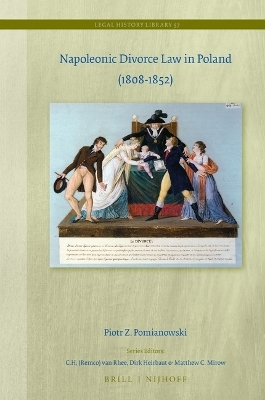
Napoleonic Divorce Law in Poland (1808-1852)
Martinus Nijhoff (Verlag)
978-90-04-50669-5 (ISBN)
In 1807 Napoleon Bonaparte created the Duchy of Warsaw from the Polish lands that had been ceded to France by Prussia. His Civil Code was enforced in the new Duchy too and, unlike the Catholic Church, it allowed the dissolution of marriage by divorce.
This book sheds new light on the application of Napoleonic divorce regulations in the Polish lands between 1808-1852. Unlike what has been argued so far, this book demonstrates that divorces were happening frequently in 19th century Poland and even with the same rate as in France. In addition to the analysis of the Napoleonic divorce law, the reader is provided with a fully comprehensive description of parties as well as courts and officials involved in divorce proceedings, their course and the grounds for divorce.
Piotr Z. Pomianowski, Ph.D. (2012), habilitation (2018), University of Warsaw, is Assistant Professor at that university. In his research, he focuses on the reception of French law in Poland and on the Polish judiciary, codification, and political thought in the first half of 19th century. Among others, he published "Divorce proceedings pursuant to the Code Civil and the Code de procédure civile of 1806 in the practice of Polish Courts" (Vergentis, 2018) and "Legal Status of Women in Codes Binding in Central Polish Lands in the Early Nineteenth Century" (Journal on European History of Law, 2020).
Abbreviations
List of Illustrations
Tabula debitorum
Introduction
1 Marriage Through the Ages
1.1 Marriage and Divorce in Judaism and Christianity
1.1.1 Marriage and Divorce in Judaism
1.1.2 Marriage and Divorce in Christianity
1.2 Laicization of Marriage Law in Austria, Prussia and France
1.2.1 Austria
1.2.2 Prussia
1.2.3 France
1.3 Changing Fortunes of Law in the Polish Territories in Late 18th and Early 19th Century
1.4 Abrogation of the Napoleonic Family Law in the Polish Territories
2 Courts and Officials Involved in Divorce Proceedings
2.1 Divorce Court
2.2 Prosecutor
2.3 Huissier
2.4 Clerk and Underclerk (pisarz and podpisarz)
2.5 Legal Position of the Parties
2.6 Legal Representatives
2.7 Civil Status Officials
2.7.1 Roman Catholic Parish Priests
2.7.2 Parish Leaders of Other Congregations
2.7.3 Lay Persons Responsible for the Comprehensive Maintenance of Civil Status Records
2.7.4 Lay Persons Recording Events Contrary to Canon Law
3 Course of Divorce Proceedings
3.1 Proceedings in Divorce Cases for a Determined Cause
3.1.1 Pre-Divorce Formalities (Attempt at Reconciliation)
3.1.2 Preparation of the Decision to Allow or Deny Hearing the Case
3.1.3 Default Divorce Proceedings
3.1.4 Provisional Measures
3.1.5 Proceedings after Allowing the Case to Be Heard
3.1.5.1 General Remarks on Evidentiary Proceedings
3.1.5.2 Documents
3.1.5.3 Witness Statements
3.1.5.4 Presumptions
3.1.5.5 Judicial Acknowledgement
3.1.5.6 Oaths
3.1.5.7 Other Evidence
3.1.6 Proceedings in Divorce Cases Initiated due to a Spouse’s Condemnation for a Felony
3.2 Proceedings in Divorce Cases by Mutual Consent
3.3 Steps Immediately Preceding the Delivery of Judgement
3.4 Judgements
3.5 Types of Definitive Judgements
3.5.1 Judgements Pronouncing Divorce
3.5.2 Dismissal of Petition
3.5.3 Judgements Prescribing a Probationary Period
3.6 Cases Ended with No Judgement
3.6.1 Expiry Caused by the Petitioner’s Failure to Pursue the Case (Cases with Unknown Outcome)
3.6.2 Discontinuance of Action
3.7 Appeal and Cassation Proceedings
3.7.1 Appeal Proceedings
3.7.2 Extraordinary Means of Challenging Judgements of Appellate Courts
3.8 Pronouncement of the Divorce Judgement by a Civil Status Registrar
4 Grounds for Divorce Judgements
4.1 Divorces due to Outrageous Conduct, Ill-Usage and Grievous Injuries
4.2 Divorces Pronounced due to Outrageous Conduct, Ill-Usage and Grievous Injuries following a Probationary Period
4.3 Pronouncement of Divorce on Grounds of Adultery
4.4 Divorce due to a Spouse’s Condemnation to an Infamous Punishment
4.5 Divorce due to Previous Separation
4.6 Comparison with France
5 Rulings on Subsidiary Matters
5.1 Ruling on Fault
5.2 Custody over Children
5.3 Property Issues
5.4 Alimony and Child Support
5.5 Punishment for Adultery
5.6 Costs of Proceedings
6 Divorce Statistics
7 Characteristics of the Divorcees
7.1 Initiators of Divorces
7.2 Age of the Divorcees
7.3 Duration of Marriages
7.4 Ability to Sign
7.5 Predicates
7.6 Profession
7.7 Religious Confessions
7.8 Place of Residence
7.9 Summary
Conclusion
Bibliography
Index
| Erscheinungsdatum | 31.01.2022 |
|---|---|
| Reihe/Serie | Legal History Library ; 57 |
| Sprache | englisch |
| Maße | 155 x 235 mm |
| Gewicht | 623 g |
| Themenwelt | Geschichte ► Teilgebiete der Geschichte ► Militärgeschichte |
| Recht / Steuern ► Rechtsgeschichte | |
| ISBN-10 | 90-04-50669-1 / 9004506691 |
| ISBN-13 | 978-90-04-50669-5 / 9789004506695 |
| Zustand | Neuware |
| Haben Sie eine Frage zum Produkt? |
aus dem Bereich


